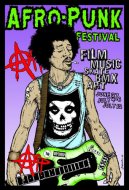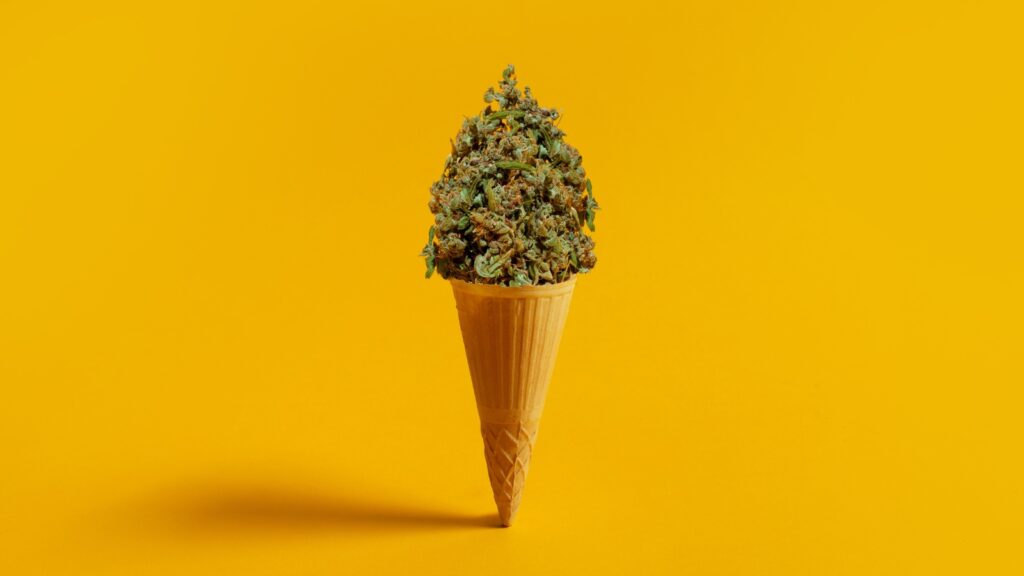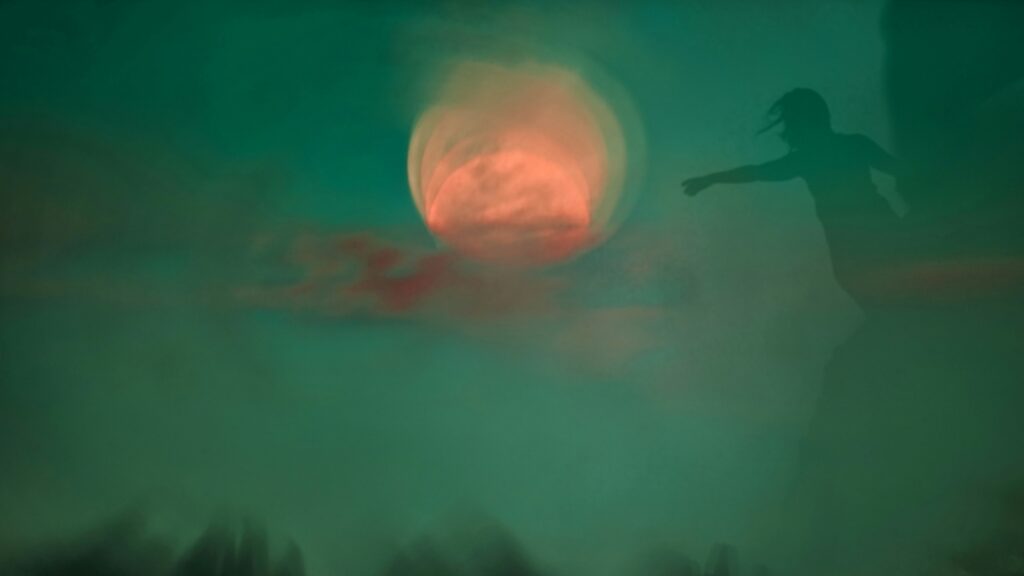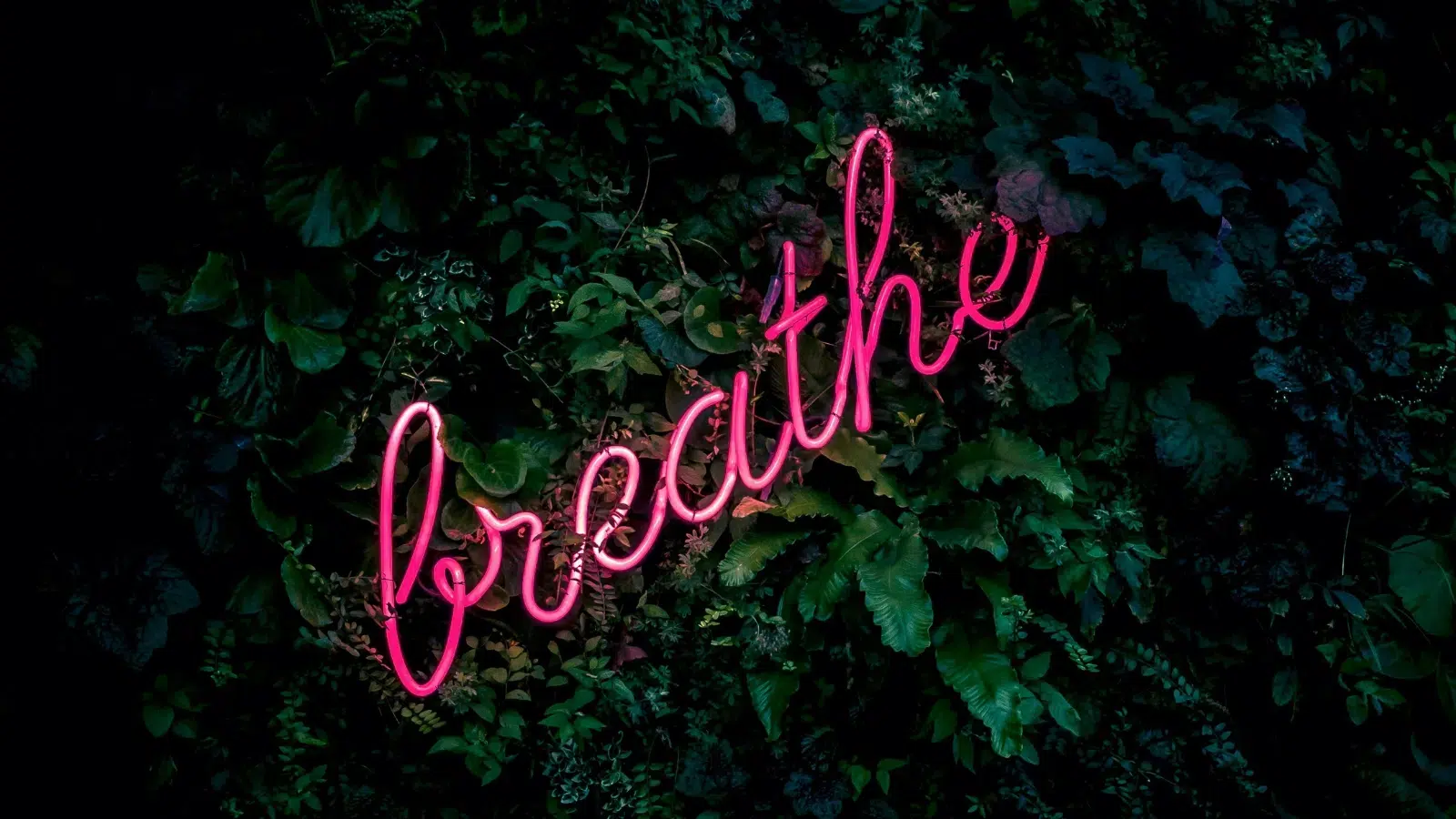In 1979, Lester Bangs wrote the article, The White Noise Supremacists, expressing his concern and rage at the amount of racism held by white punk rockers in the CBGB scene. Bangs, who rarely skirted an issue, even acknowledged his own racist slurs in this article, and let the reader in on his growth towards understanding ignorance and stating his private manifesto for being a better person. If only more people were like dear ole Lester. According to James Spooner, artist, DIY filmmaker, African-American, and punk rocker, the ignorance around race within the punk scene still exists, in different ways, thirty years later.
So besides rigorously examining his self-identity as a black person within punk rock in America, Spooner also explored these things in his 2002 documentary film entitled AfroPunk. Spooner’s documentary set off a cultural phenomenon that is going strong today. His movie led to a website, and this website then inspired a music festival.
I had the chance to speak with Spooner on many relevant issues that are raised when one looks at race, punk rock, identity politics, and art. These are vital questions that are at the forefront of many interesting conversations today. Read on and enjoy.
Prop: I’d like to ask you about the movie Afro-Punk. Could you provide a general run down of the movie and the movement that followed it?
JS: In 2001, I was living in Williamsburg, Brooklyn and had been involved in the fine arts scene for a few years. I moved out of a studio and into an apartment, which limited what I was able to do artistically, so I started playing with the ideas of working smaller. At the time I was a sculptor. With the new living situation, the thing that made most sense to me was writing or photography. I had never really done any of that. At the same time I was going through some form of identity crisis. I was looking at my life as a mixed-race person, as a black person, as a punk rocker. Even though some of my friends were of color, I didn’t really have a lot of black friends. I didn’t think I had a valid black experience, and ultimately I felt like I was missing out on something. And out of those things I came up with the concept of making a documentary about what it is like being a black person in the punk rock scene. Part of that was going to be a critique of Punk Rock, and part of it was going to be asking and possibly answering the question, “What does it mean to be black?”
To begin, I started finding people I knew who fit the critiria and who had that experieince, and began having conversations with them as well as filming them. As I went more and more into it, I fine tuned the questions. I was able then to get an understanding of how the film was going to look and feel and be told. I learned from my mistakes as I went along. The same goes for the editing, sound, shooting process with all of it. It was a two-year process, and over those two years I had defintely grown.
Then I started showing it hardcore for three years, did like 300 screenings in that time. During this process, in seeing the people that came, meeting all kinds of black folks who had the same experience, whether it was with punk rock or it was with whatever their life was, I realized what I thought to be true was correct, and that was that there are various experiences that make up the black experience. The media only covers one or two. The media has a very small and skewed understanding of what it means to be black and everything that doesn’t fall within the scope and categories seem to question their own black experience and Afro-Punk validated my own experiecne and I saw it validate the experience of so many other people.
I came away from the whole thing feeling that my experience as a black punk rocker is every bit as valid as a black person from the south who grew up with hip-hop or gospel. There seems to be as many people who feel like they don’t belong in the black experience, and this movie seemed to validate a lot of positive things for people.
The history and movements of punk seem to lead up to a crescendo of where people began saying that punk went pop at a certain point, maybe from it’s commercialization being blasted on MTV; and this movement becomes more suburban and white. Can you provide more detail on this?
Well, I wouldn’t say that MTV made punk a white, suburban thing. I see the commercialization of punk rock being when Green Day signed to a major label. Before that, there was grunge, which had nothing to do with punk rock or hardcore, it was like a seperate world. I grew up in the punk scene in New York City, which had a very distinct and hardcore vibe. It only took me a year or so to start going to shows in the suburbs of New Jersey, Pennslyvania, Boston, D.C, all the surrounding states.
I found that the best scenes, the biggest scenes, and the most positive scenes were very much white, suburban; those were the kids whose parents might give them money to start their record labels or buy them the Marshall half stack so that they could be in bands, which was a very different vibe than New York City, where you had to rent a studio space for two hours to practice, versus playing in your garage all day long.
So what happened when Green Day signed to a major label, and the flood gates opened, that sound became popular, that sound existed before, Green Day didn’t change their sound at all. Jawbreaker was a huge underground band, and they did change their sound when they got signed and essentially broke up. All of that pop-punk stuff existed, it just only really came out of the Bay Area. If you look at any of the LookOut Records stuff from the 80’s and 90’s, it all sounds like Blink 182. And even Blink 182 was an underground band for a lot of years.
So what happened in the evolution of things, punk became mainstream. It just took a lot longer than hip-hop. Punk is obnoxious and sounds horrible to most people, so it took a long time before it caught on. so now that it caught on, people will say that punk is finally dead. Though from time to time I will go to shows, and those shows are exactly the same as they were when I was a kid. Those kids have the same motivations, the same politics, they may dress a little different but I see a lot of similarities. As long as there is a mainstream, there will be an underground. There are also certain sounds that are too obnoxious and gross sounding that will never appeal to the mainstream.
I don’t think that punk is dead. I think that most people who say that are old. People have been saying punk is dead since the Black Flag era. Those are the people that listen to the Ramones.
In truth punk dies when you go to college. Or when you are 22 and go to a show, you are the old guy at the show. And that’s the way it’s supposed to be.
So in terms of your white friends within the punk scene you were involved with, what was your own experience with the on the ground face to face turning to your friend and saying, “Let’s talk about white privilege.”
At the time I didn’t even have the vocabulary to for that. I knew that there were times when I realized that I had friends in the suburbs who didn’t want to come to New York, because my house was grimy to them. I had friends in New York who never had a problem with that. That was a class issue, but it also stemmed from their whiteness, and I didn’t know how to verbalize that. I was too young, and didn’t understand the concept of white privilige. I knew about “white guilt” only because of a band called Down CAST who sang about it.
I have or create an oppurtunity to learn about that kind of stuff, and my black friends who were punk rockers, and I had several of them at different points in my teen years –especially when I was going to shows in New York, because it’s a lot more culturally diverse there — but I think the thing that we all had in common was that we didn’t want to talk about race. We were all kids who got called by our racial peers as trying to be white, so when we got together we didn’t want to talk about race. So when we got together, we were able to relate to each other about everything else.
To also flip it around, when I was around a bunch of white kids, the last thing they want to do is talk about race. I think that to most progressive and liberal people, being called a racist is their nightmare. So when you start talking about privilege or something like reparations it becomes apparent that they do have prejudices and a lot of people aren’t willing to face the facts on that stuff and to do the work to examine what kind of prejudices they have.
There is a good quote from you where you say that, “Race doesn’t matter. Race is a lie. However, I also understand that racism does matter. And that is the truth.” I dig it. I knew what you mean. But I’d like to get into that a little, if you’d like to get open about that.
If you take any time to examine race, the concept quickly starts to unravel. And you will look at it and say “Well this doesn’t make any sense.” And it really unravels when you start talking about mixing. So, at this time in history, I am half black, so that makes me black. Some people might not consider someone who is a quarter black, black. They might say that is a joke. Pretty much everyone would laugh at someone who was an eighth black, and who was repping for being black. But 50 years ago, and definetely 80 years ago, you could be a drop black and rep for being black. A president of the NAACP for twenty years was like 1/64 black, that would mean that his great great grandparents were black, and he was the leader for the NAACP. So clearly there was a different thing going on then than now. So the reason that that can exist, is because it is an idea, and ideas can evolve, just as racism has evolved.
A friend of mine views racism as a virus. And I think that is a very good analogy, because when viruses are battled they get stronger and they change, and this is what’s going on with racism. So now we are not dealing with the back of the bus, but we are still dealing with segregation on a very real level.
So race was invented to justify slavery. Before that, black people didn’t exist. Africans existed, people of African decent existed, but the idea of “I’m black and you’re white” didn’t exist. So it’s a fairly new construct in the grand scheme in the amount of millions of years people have been walking the planet.
Word. With viewing racism as a virus. I interptet that statement, speaking about institutional racism, how policies put into play years ago still reverberate today. Would you care to get into that a bit?
I think that there are things that are clear, like the educational system, it seems like the most obvious example of how racism permeates throughout time. If you take two schools from different neighborhoods, and the one that is really shitty is probably the one that black and brown kids go to. That directly affects their education, that directly affects their chances of having a job that makes them any kind of money, that directly affects their desire to move beyond ghetto mentality. There are so many examples. It’s like the prison system, and the reason that the stats are the way they, where the vast majority of people in prison are black, is probably related to the amount of black kids in foster care. It’s like one institution bleeds to the next. These are things that do exist for white people, but they don’t exist on the same ratio for black and brown kids. If you had the situation where the number-two killer for white women was HIV, I think that HIV would be taken much more seriously. But because it’s the number two killer of black women, the biggest demographic of people dying from it are African, yes, it’s an issue, and yes it’s something to be thought about, but it’s not at the forefront of the political agendas. You see it over and over, how many examples are needed? If Katrina happened in Beverly Hills, how long would it have taken them to help those people?
Rebacca Walker is a multi-racial author who wrote an article about Obama’s “blackness.” The way that she wrote the article, she was saying that Obama was not just black, he is multi racial. But in the world in which he grew up there wasn’t even a way to identifiy that according to census bureau papers. You either checked a “black” “white” or “other” box back then. In college, he started identifying himself very much as black. Her article was interesting in that she seemed to be saying that we can all get beyond an either/or perspective with race, and that there is empowerment found in being multi-racial. So you are multi-racial, where are you in terms of this? How can multi-racial become an empowering stance, politically and economically?
Well it’s complicated because of all the things that happened in slavery, I think the one mistake in the Jim Crow laws was the One-Drop Rule, because being mixed made you just black, it made more people “black.” So granted we definetely have this other part of slavery and racism, which is an inter-racism thing, which is more a colorism thing. So for generations, if you could pass as white, you were encourgaed to pass, so you could have a happy life. So many, many light-skinned black people were quote-unquote “lost” into the white world. So much so that some never would even talk to their families again. I say that because the residual affects of that are still apparent. There is still resentment among dark skinned blacks to light skinned blacks. Not only resentment, but also admiration. It’s no coincidence that every single R&B woman eventually bleaches her hair blonde.
I think it’s a jerky situation to claim too much pride to claim multi-racial, because multi-racial people often look mixed, or light skinned or exotic, and there is privilege in that, so you are sort of having pride in your privilige. For me personally, I’m very happy that I’m mixed. I wasn’t always, but I am now. Becuase it has given the opputunity to have all these different experiences in my life. the more culture you have, the better a person you are I think. And that doesn’t have to be the culture you were born with, the further you get off your block the better a person you are. So it’s interesting, I have had this discussion with my fiance. She is Jamaican, but she’s black and Chinese. So what does that make our off-spring? Do they just revert back to black at that point? Or are they multi-racial?
Then you get back to the question that we started with, the idea of race, which gets very complicated once you start straining it or diluting it. I don’t necessarily have any clear-cut answers on this point. I’m happy with the cards dealt to me. It was definetely a tough road, and there were times that I wished I were all white and there were times when I wished I was all black. But now that I’ve gone through those tough times, and I know who I am, I’m really pleased with the hand that I am holding.
Right On. Just wondering about with the tours you did with the movie at all the spots you took it, did you get any whites kids coming up to at screenings and acknowledging white priviliege and then ask you, “Well what can I do?”
Whenever a screening is for primarily white audiences, I figure that they are there becuase they fancy themselves as “anti-racist.” With that assumption, I talk to them and say, “The most important thing that you can do, way more so than go into a Mumia rally or listen to rap music, is to sit down in conversation with your white friends, and if you hear a white person say something that is inappropriate then check them on it.” That’s the only way that we’ll ever be able to succeed in defeating racism. For someone who is racist or priviliged, they are much more open to hear and understand it from their own people.
Can you break down that last part a bit more?
Well, when I was in high school, around 15 or 16, and I used to listen to a lot of gangsta rap along with all the punk music. I used to think it was funny when Eazy E or Ice Cube would refer to women as bitches, and I didn’t take offense to it in any sort of way, I just though it was silly, and I referred to women as bitches. I had female friends who would tell me that that’s not cool, and my response would be “it’s a joke, get over it.” I had this one friend Greg, who said the same thing that the women were saying, and I listened to him and I never casually refered to a woman as a bitch again, but it took anonther guy to tell me that. I heard it from my people, a dude, you know. So I just think that people listen and respect people who remind them of themselves in some way.
So there was “AfroPunk” the movie, and now there is this huge upsurge of cool energy in . . . would you call it a movement? Is that what it’s referred to now, as the Afro-Punk Movement?
People call it that. It’s referred to that on the website, so people do call it that.
Well, what do you think of all that?
At this point, I’m not really involved in the Afro-Punk company. My name is on the LLC, but I’m really just an advisor, at this point. But the movement is ill. When I was making the movie, just as I started it, this Latino punk documentary came out called Beyond the Screens. There were scenes in it where there were these tons of Mexican kids into punk. They had footage of this show in Mexico of hundreds of Mexican kids moshing. And I’ve experienced being in Phoniex and where it would be me and the band beng the only non-Mexican people there. I remember thinking out loud that this will never happen for black people. But I’m gonna make this movie.
To have the movie come out and then start dong some shows and quickly seeing the demographic change from 20-30% black to like 80-90% black was bananas for me. And with all the people who were there it was exciting for them, because it was their first time experienceing this kind of music and just to have that kind of music and aggression and to be able to mosh and hit people and to not have it turn into a fight was exciting. For me as much as everyone else. When we started the message board, where it was me begging people to just sign in, just to pretend that there were people on there, to where it went to hundreds of people on the site and really getting to know these poeple. For the first couple years I was on the website every day and I was part of the community. I was pretty much always available.
I saw a lot of people make some real solid friendships off of the message board. And now it’s so expansive and is conituning to grow. It’s way beyond anything I thought it would be, and anything I feel comfortable controling or trying to dictate in any kind of way. It’s ill you know. Who knew you could go to a skate park in the middle of Fort Greene and there’d be 400 hundred black kids skateboarding? Who knew that that caould exist? And it does now, and it’s great.
How I see Afro-punk working is in allowing young black youth more modes of expression, which is very powerful. And in turn this allows more for everyone. In the past five years, I’ve seen a lot of really cool expressions within my own scene of hip-hop, in different forms of expression, even in ways of dress.
Oh, definetely. The media can’t control it anymore, or they don’t even know how to control it anymore. Let’s face it, the record industry is dead. So they’re grasping at straws. So when a kid comes out and ryhmes about skateboarding, they’re not going to push it away. They are like “Oh shit let’s give it a shot.” So Lupe Fiasco comes out with one song, and then thousands of black kids on skateboards. And that’s kind of how it was in the Golden Era, where whatever you were into as a black youth you could find hip-hop music that matched you.
You weren’t forced to swallow gangsta rap, or forced to swallow jiggy stuff, cause there were groups like Digable Planets, Tribe Called Quest, Arrested Development. And who ever you were you could find hip-hop that matched you. So though there was peer pressure, there always will be, it wasn’t like be jiggy was the only option, and for a lot of years after the Golden Era that really was the only option.
I’m a little weary of codifying certain sounds, but it happens, one thing about Afro-Punk I’m cool with but at the same time I wonder about, is this: now things might just be called Afro-Punk as if it were some sort of brand. What’s your take on this?
Well the one thing that I was really adament about when putting together shows, and as far as I know, it’s the only rule we have, I don’t book the shows anymore but I think Matthew Morgan has adhered to it, despite all kinds of temptation to do something else. The first thing is that there is no sound that can be labeled Afro-Punk. The only requirement you have to have to play a show is a self-identified black lead singer. We’ve only had one exception to that. They are a three piece band, the drummer and bass player are black but the main vocalist is white. And the other rule is that you have to be good. I’ve seen the error of other black rock organizations made by putting up any piece of crap that had black memebers in the band. If you suck it’s not helping the cause any. There’s a few bands who I’m not into who’ve played shows, but I try to look beyond my own personal tastes and ask, “Is this good? Will this rock somebody?”
There are people who refer to bands as Afro-punk bands as a genre. There are bands who describe themselves as Afro-punk. I don’t know what any of that means. To me Afro-Punk is just a movie I made and subsequently a community of people who gather around alternative black artistry. Afro Punk is too big for me right now. The festival was so fucking dope, but there were certain bands that had security. I don’t like going to shows where I couldn’t get on stage if I wanted to. Or the stage is taller than me. I don’t like to go to shows that have more than 300 hundred people in the audience. I’m glad for where it’s going, but it’s bigger than me.
Cool. Let’s talk about your newest film White Lies, Black Sheep.
Sure. I got an opportunity to make this film. I took it and wrote the script hella quick, in three months. I had to edit it for around a year and a half because the script was so piecemeal. And the way I directed the film was very organic and adlib, so I had to edit it for a long time to make it a movie worth watching. Ultimately I think I succeeded. I don’t know if the film breaks any new ground that Afro Punk did, but I would make the analogy that this film is what Wild Style was to Style Wars. It’s definetely worth the watch, and I entered it to some festivals and it’s getting around.
I haven’t grinded it the way I did Afro-Punk because I’m thinking about other stuff. I’m on to new projects.
I had to make Afro-Punk, I had to tell that story. So by the time my life came around I had already told the strory, but I wasn’t ready to tell another story. So I told that story in a new way. It wasn’t like a part two to Afro-Punk, it was different. Emotionally I had gone through what I needed to go through in order to make that movie.
Does it have a theatrical release or is a festival thing like Afro-Punk?
The difference between these two movies is that this one had a producer, so I don’t have complete control over it. It may never see the light of day as far as DVD goes, because it would require a lot of clearing that I am not willing to do. I would probably just put it on the internet for free and call it a day. But the people who invested their money would probably want their money back so they’ll have to continue the efforts of getting it available to be distributed. We have some offers on the table, so we’ll see what happens. We’ll get it out there.
So what are you working on now. What’s got you creatively enthused?
I just started a documentary that I’m not yet ready to talk about publicly, because it’s at such an infant stage of development, and I don’t wanna be one of those people that talks about stuff that never happens. But I’ll say that I am working on a documentary that deals with complicated racial issues that is centered around L.A. bike culture. The big Critical Mass stuff. Where you get between 50 and 500 people going out and riding bikes. So that’s the vehicle for the story in which I will be going into racial issues.
I’m not mr. hardcore protest dude, but I’ve been to my fair share. And in observing the racial dynamics to protest culture, the demographics seem somewhat skewed.
That’s not exactly what this film deals with. For instance, there are party rides where a bunch of people get together, dressed in outfits, getting drunk and riding bikes for no other reason than to get together and have fun. But on that activist trip, it makes complete sense to see that racial representation in activist culture. I mean, why would I sit around and worry about the war when I can’t even feed my children? On a certain level with activism one must have some privilige because it’s a secondary thought. Before you think about worrying about other people, you have to worry about yourself and your own survival. So you are not going to see people protesting foreclosure unless they are being foreclosed upon.
Right on, man. Thank you for sharing your time.









